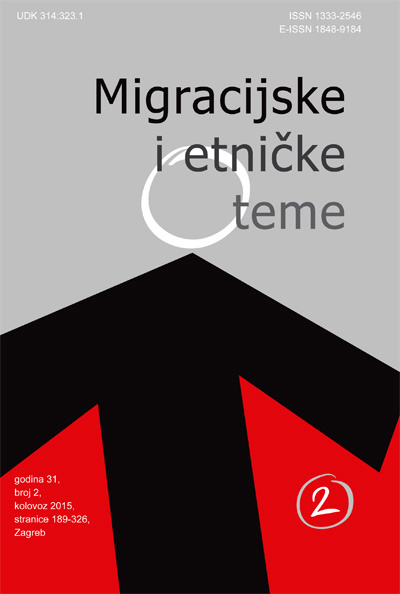Bijeg iz socijalističke Jugoslavije – ilegalna emigracija iz Hrvatske od 1945. do početka šezdesetih godina 20. stoljeća
Escape from Socialist Yugoslavia ‒ Illegal Emigration from Croatia from 1945 to the Beginning of the 1960s
Author(s): Tatjana ŠarićSubject(s): History, Social Sciences, Political history, Recent History (1900 till today), WW II and following years (1940 - 1949), Post-War period (1950 - 1989), History of Communism, Migration Studies
Published by: Institut za migracije i narodnosti
Keywords: socialism; FRY; Croatia; emigration; illegal emigration; youth
Summary/Abstract: In the post-war socialist Yugoslavia political and/or economic situation has become unacceptable for part of the population. Since legal emigration from Croatia was not allowed, the number of illegal immigrants increased since the end of World War II. The article deals with this group of migrants using the comparative analysis of original archival materials and available literature in the period from 1945 to 1961 when the state began to gradually open the border. Mostly young people, under 25 years of age, immigrated illegally, mainly for economic reasons, and this was associated with a tradition of emigration, especially in the coastal region. In addition to the poor economic situation, people also emigrated for political reasons, then for adventure, to avoid serving in the Yugoslav People’s Army or to escape from the law for committing criminal offenses. They were fleeing by land or by sea, which was much more successful. Usually the first destinations of the immigrants were Italy, Austria and Germany, from where the majority of them moved to overseas countries. Most people fled the districts of Rijeka, Pula, Zagreb, Zadar, Šibenik and Split that existed at that time so that 74% of all illegal immigrants came from them. The runaways were mostly workers, followed by farmers, vocational school students, public servants, pupils and students, sailors and craftsmen. According to gender, there were many more men than women among the runaways, most of whom were unmarried. The authorities were trying to prevent the escape abroad by methods of controlling the border and prison sentences, but also by the attempts to ensure better living conditions in the affected areas. As these measures had not yielded the desired results, but also due to the beginning of the economic crisis and the appearance of unemployment, the authorities liberalized emigration procedures and opened the borders to immigrants which resulted in a new wave of economic emigration.
Journal: Migracijske i etničke teme
- Issue Year: 2015
- Issue No: 2
- Page Range: 195-220
- Page Count: 26
- Language: Croatian

